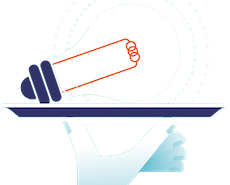It is said that one of the first patent system was created to encourage glass blowers to divulge the secrets of their trade. Previously, glass blowers were taking their secrets to their death such that each glass blower would have to learn the technique from scratch. A patent system balances rewarding the inventor for their ingenuity and the public interest. With this in mind, does the patent system make sense for technology relating to COVID-19 treatment?
In general, patenting new drugs can be in the interest of the public as well as the pharma company since there are significant costs to drug development and some of the profit from drug sales goes into R&D of future drugs. What’s more, obtaining a short-term monopoly on a developed drug creates a financial incentive to produce the drugs in the first place.
There is increasing pressure to allow the waiving of patent rights relating to the Vaccines for COVID-19 until the end of the pandemic. This would mean that any enterprise could use the vaccine technology without any risk of infringement action. Manufactures all around the world would be able to commence manufacturing and sale at their own price resulting in more available doses and more flexible prices.
However, enforcing a waiving of patent rights risks creating insecurity around patent rights which may result in negative consequences such as discouraging pharma companies in the future from developing life-saving technology or pharma retaining their Know-how as trade secrets.
It seems fair that companies such as Moderna and AstraZeneca should be rewarded for their contribution to medical science for their innovative ingenuity but having them control the one thing that can bring the pandemic to an end seems disproportionately against the public interest.
Can a middle ground between waiving patent rights completely and giving the pharma companies total control be found?
In the patent world there is something called Standard Essential Patents (SEP). When a company holds a patent to technology that is required for legal standards compliance, the patent holder is required to license the technology to other companies under fair, reasonable and non-discriminatory terms.
Perhaps something similar could be introduced for life saving drug patents wherein, similar to the SEP, an owner of such a patent, such as the Moderna or AstraZenica vaccine patent, would be required to license their technology under fair, reasonable and non-discriminatory terms.
In this way, vaccine manufacturing can be ramped up by the capacity added by external manufacturers, the cost to produce and the cost to the consumer will be fair and the inventors of the technology will still get recompensed.





